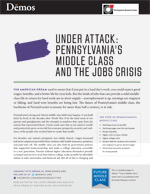Pennsylvania's middle class is in jeopardy. Once the home of a thriving manufacturing sector, robust union participation, and an example of smart policy choices and a stable middle class, the state has been caught in a downward spiral that mirrors unfortunate national trends. And though Pennsylvania has weathered it better than most, the Great Recession has intensified this spiral in the Keystone State as well.
Not only did the state lose over 350,000 jobs because of the Great Recession, but the economic effects of those lost jobs reverberated to all corners of the state, particularly the already-strained finances of the state government. We estimate that the jobs lost due to the recession have cost the state nearly $726 million annually in lost sales and income tax revenues, on top of other revenue losses from the recession, resulting in further lay-offs of thousands of middle-class public sector workers. If the state's unemployment rate were at pre-recession levels, those lost hundreds of millions would return to the state government's coffers, and could be used to help thousands of young people attend college, maintain dozens of state parks or hire, for example, as many as 8,500 teachers or 7,700 nurses. While Washington spins its wheels debating the budget deficit, middle- class workers know that it is another kind of deficit-one of jobs and wages-that most affects their future.
Stable middle-class jobs with benefits are increasingly hard to find, meaning two earners in a family can work hard throughout their lives and nevertheless be left in the lurch when something goes wrong or when it comes time for retirement. Earnings are down over roughly the last decade, and unemployment and slow job growth limit the likelihood of change in this pattern. A college degree has grown increasingly necessary to earn higher wages. Yet these degrees are increasingly expensive, leaving graduates mired in record debt.
Despite the obstacles, there is good reason to hold out hope for Pennsylvania's long-term prospects. Pennsylvania is a state of homeowners and hard workers. Pennsylvanians stand firmly committed to their roots. As evidenced by the positive impact of the American Recovery and Reinvestment Act, the state's economy is also receptive and responds well to effective policy ideas. And with higher union membership rates than the national average, there is also a basis for increasing worker rights and employer responsibilities for both unionized and non-unionized workers alike. Focusing on the unique qualities of Pennsylvania as assets, workers in the state can regain a permanent place in the middle class.

